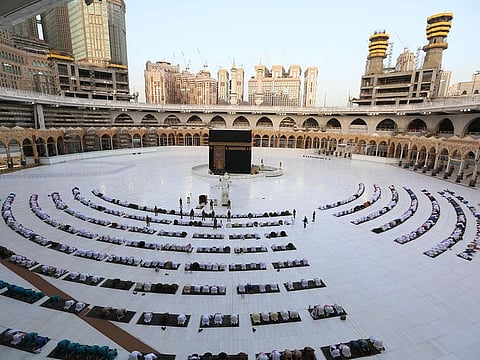Scaling back of Haj a tough but responsible decision
Public health consequences of holding a pilgrimage of this scale cannot be overstated

Saudi Arabia this week dramatically scaled back the annual Muslim pilgrimage of Haj, limiting it to a small number of faithful living in the country.
The decision, taken after months of careful deliberations, is commendable and comes at a time when Coronavirus outbreak is on a surge globally. The World Health Organisation called it a “tough decision”, pointing out the “hard choices” nations have to make, prioritising public health over religious obligations.
The world may be compelled to reopen businesses, factories and commercial establishments to minimise the pandemic’s devastating impact on the economy. Still, until a vaccine is available, nations cannot take the risk of allowing large gatherings, including a pilgrimage.
By scaling back Haj, Saudi Arabia, on the other hand, has demonstrated its resolve to protect public health. The Saudi leadership draws its moral strength from Islam, a religion that has always preached pragmatism and flexibilityGulf News
Haj attracts over 2.3 million people who perform weeks-long rituals in the Islam’s holiest sites of Mecca and Madinah. Public health consequences of holding a pilgrimage of this scale cannot be overstated.
A gathering of this kind would have brought a new wave of outbreak into Saudi Arabia and pilgrims would have returned to their home countries with newly-acquired infections.
Also Read: Dubai is set to connect the world, again
Also Read: The UAE is now open for business and life
Therefore, Saudi Arabia acted responsibly and decided to bar foreigners from attending the pilgrimage to be held late July. The pilgrimage helps the Saudi economy in a big way and the country’s leadership must be lauded for making a hard choice of placing public safety over economic gains.
According to King Abdulaziz Foundation for Research and Archives, Haj was disrupted 40 times in the past, including in 930AD when the pilgrimage did not take place for 10 years.
Still, the scaling back of Haj, a first in the history of modern Saudi Arabia, is not an ordinary event. Organisation of Haj requires months of preparations and close coordination with foreign countries on quota, air travel, accommodation and logistics.
For most Muslims, Haj is once in a lifetime religious obligation for the able-bodied who save and prepare for years and because of national quotas, only a lucky few get a chance to perform this pilgrimage.
Ever since the pandemic began, governments around the world have faced a dilemma, how to restrict religious gatherings without hurting public sentiments. In some countries, authorities gave in to public pressure, allowing religious events involving mass gatherings.
By scaling back Haj, Saudi Arabia, on the other hand, has demonstrated its resolve to protect public health. The Saudi leadership draws its moral strength from Islam, a religion that has always preached pragmatism and flexibility.
Many Quranic verses dealing with health issues, including diet, nutrition, disease and the sayings of Prophet Mohammad (PBUH) provide guidance on protecting lives during epidemics.



